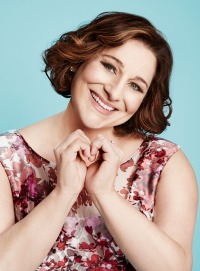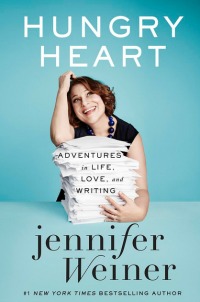With a "Hungry Heart," Jennifer Weiner Talks Creativity and Character

Photo © Maarten de Boer
Best-selling author and outspoken New York Times columnist Jennifer Weiner moves from fiction to nonfiction in her new memoir, Hungry Heart: Adventures in Life, Love, and Writing (Atria, Oct., LJ 9/1/16). Here she answers questions from Weiner fan and LJ women’s fiction reviewer Chelsie Harris. In your memoir, you draw many comparisons between your life and that of Cannie in Good in Bed. Would you say that she was your favorite character to write and, if so, why? If not, which character was the most enjoyable to create? Cannie was the closest to me—or, at least, to the 28-year-old version of me—but that doesn’t mean she was the most fun. I loved writing Janie Segal (“of the carpet Segals”) in Goodnight, Nobody because she was such a filter-free, don’t-give-a-crap creature, who was nothing like me: She was beautiful, she was rich, she could say whatever she wanted, she could try to get her awful stepmother in trouble by calling Customs and telling them her mom was carrying weed. And Mrs. Lefkowitz, from In Her Shoes—also a hoot, also with no filter. Hmm, I think I’m sensing a theme! And in the book I’m writing now, I’ve got a frustrated literary novelist—great reviews, poor sales—who is looking, with envy and with interest, at all of these posthumous memoirs of guys dying young, and thinking about faking his own death. He’s fun, too! Which character is your foil? IRL, my sister, Molly. I’m her straight man. You write a lot about your vivacious sister, Molly, in Hungry Heart. What would you say are the top three life lessons you learned from her? Molly’s number-one life lesson would be “Go for it.” If you really want your mom to buy you that special shampoo for permed hair, pitch a fit, right there in the CVS aisle. Lie down and flail at the carpet! Kick your feet! Call your mother names! If a classmate should happen to see the whole thing, just shrug and own it.
Which character is your foil? IRL, my sister, Molly. I’m her straight man. You write a lot about your vivacious sister, Molly, in Hungry Heart. What would you say are the top three life lessons you learned from her? Molly’s number-one life lesson would be “Go for it.” If you really want your mom to buy you that special shampoo for permed hair, pitch a fit, right there in the CVS aisle. Lie down and flail at the carpet! Kick your feet! Call your mother names! If a classmate should happen to see the whole thing, just shrug and own it. Number two: do not underestimate your own importance. Molly always believes, usually correctly, that she’s the most attractive and interesting person in any given room, and she behaves accordingly. More women could use a shot of that. I know I could!
Number three: do not enlist your mother on your maiden voyage into the land of bikini waxing. That’s one of the stories that didn’t make the book!
If you could speak directly to women of any age who feel isolated and bullied, what would you say? There are two stories about bullying that I’ve read recently, and they’re both just haunting me. One is the story of the 13-year-old boy from Long Island who killed himself. He was being bullied terribly at school, and it sounds like he was telling his teachers, and telling his parents, and nobody was stepping up and doing anything—or at least, no one was doing enough.The other is a first-person essay by a woman who stopped drinking—stopped seeing the world through the pacifying, beautifying filter of wine—and started noticing things. Like how, at her business, she was asked to be “the woman” on a panel talking to the summer interns, and when the young women asked what it was like to be female at her place of work, and she said, “You need a thick skin,” the men on the panel immediately jumped in to say, “Oh, no, women are treated fairly here,” and “There are women on my team and we all get along great.” I can’t imagine a worse feeling than having your own experiences invalidated to your face, or hearing that someone else’s impression of your life mattered more than your own.
Whether it’s women, or children, or anyone, I’d say that everyone has a right to be heard, a right to knowing that her voice matters and her story is going to be believed. And if that’s not happening, I would tell them not to be quiet, but to keep talking until they found someone who’d listen.
It’s awful that the world is still the way it is, that there are people suffering and people dying because they’re being ignored or shut down or gaslighted—but if nobody speaks up, nothing gets better.
In this memoir, you mention the impact that the library had on you as a child. What do you see as the role of libraries in the digital age? I know there’s a lot of eye-rolling at the concept of “safe spaces,” but, to me, libraries are the ultimate safe space. They’re a place where you can read other stories, try out different identities, imagine the world, and yourself in it, all kinds of different ways, and it’s all risk-free, because it’s all happening in books.As I’m preparing to go on tour for The Littlest Bigfoot, I got this incredibly sad letter from a Girl Scout troop leader. She said her scouts live in a poor neighborhood in Philadelphia, and that their local library was closed. She bought an old station wagon and filled it with books, and drives around the neighborhood so that as many kids as possible have access to those stories, those dreams, those other possibilities, and she wrote to say that she is a fan of my adult work, and to ask if I’d send a copy of my children’s book. Cue my heart breaking.
I invited her troop to be my guests of honor at the Philadelphia reading for The Littlest Bigfoot, which will be held at my lovely little neighborhood bookstore, and I will make sure that every girl goes home that night with a book—but I worry that it isn’t enough. Libraries are crucial, and I don’t want to imagine a world, or a childhood, without them.
What do you see as the greatest barrier women are facing today and what is the first step to overcoming it? Weirdly, I think the biggest barrier is the idea that there are no more barriers. That we’ve achieved perfect equality, that there’s nothing (except, for example, a cackling laugh, or an unattractive personality) standing between us and whatever we want. And, unfortunately, too often, I think that it’s women who are perpetrating this myth.A few years ago, a writer at Slate wrote an essay that spawned the hashtag #RIPfeminism. She basically made that case: equality achieved, game over, and all feminists are doing now are squabbling over minutia. For a few months, every time a report came out that proved another jaw-dropping inequity: the number of female versus male film directors or op-ed writers; the number of books by women reviewed in some prestigious magazine versus the number of books by men – I’d retweet it with the hashtag #RIPfeminism. Every time a newspaper profile would dwell on a female subject’s hair and clothing and sexiness, or lack of same, while treating the men like, you, know, people—like the X obituary of bestselling author Colleen McCullough called her “plain of features” and “overweight?” #RIPFeminism. Whenever there’d be the story of some crime—a rape case where the guy got a slap on the wrist; an incident of domestic violence where the perpetrator was only punished after tapes of him dragging his unconscious fiancée out of an elevator by her hair went public—I’d use the same hashtag. The point is, clearly, yes we still need feminism. Yes, we still have a long way to go. Yes, things are better, but things are far from perfect.
How do we overcome it? I think we start by asking a simple question: Would a man be treated like this? If the answer is “no,” then we’ve still got work to do.
How do you cultivate your creativity? I read a lot. I take long walks, or go kayaking, or ride my bike. Any kind of rote physical activity that lends itself to thinking. I tell my daughters stories, and I have them tell me stories. I try to be present and pay attention—to them, and to the world. What’s the best book you’ve read so far this year? For sheer pleasure, I loved Curtis Sittenfeld’s Eligible. For I can’t-believe-this-is-a-first-book, Yaa Gyasi’s Homegoing. For twisty-cool plotting, Megan Abbott’s You Will Know Me.RELATED
ALREADY A SUBSCRIBER? LOG IN
We are currently offering this content for free. Sign up now to activate your personal profile, where you can save articles for future viewing









Add Comment :-
Comment Policy:
Comment should not be empty !!!